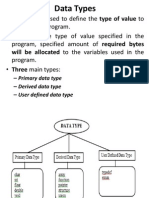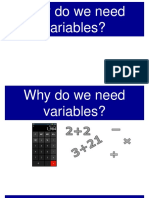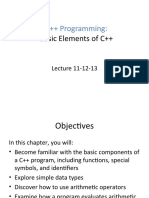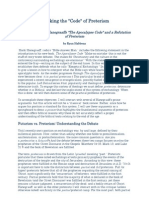Enumeration Data Types: A Data Type Is
Enumeration Data Types: A Data Type Is
Uploaded by
Manoj BojjaCopyright:
Available Formats
Enumeration Data Types: A Data Type Is
Enumeration Data Types: A Data Type Is
Uploaded by
Manoj BojjaOriginal Description:
Original Title
Copyright
Available Formats
Share this document
Did you find this document useful?
Is this content inappropriate?
Report this DocumentCopyright:
Available Formats
Enumeration Data Types: A Data Type Is
Enumeration Data Types: A Data Type Is
Uploaded by
Manoj BojjaCopyright:
Available Formats
1
Enumeration Data Types
A data type is
A set of values together with A set of operations on those values.
In order to define a new simple data type, called enumeration type, we need: A name for the data type. A set of values for the data type. A set of operations on the values.
Enumeration Data Types
C++ allows the user to define a new simple data type by specifying:
Its name and the values
But not the operations.
The values that we specify for the data type must be legal identifiers The syntax for declaring an enumeration type is:
enum typeName{value1, value2, ...};
Declaration of Enumerated Types
Consider the colors of the rainbow as an enumerated type:
enum rainbowColors = { red, orange, yellow, green, blue, indigo, violate }
The identifiers between { } are called enumerators The order of the declaration is significant red < orange < yellow
Declaration of Enumerated Types
Why are the following illegal declarations?
enum grades{'A', 'B', 'C', 'D', 'F'}; enum places{1st, 2nd, 3rd, 4th};
They do not have legal identifiers in the list
What could you do to make them legal?
enum grades{A, B, C, D, F}; enum places{first, second, third, fourth};
Declaration of Enumerated Types
As with the declaration of any object
Specify the type name Followed by the objects of that type
Given:
enum daysOfWeek { Sun, Mon, Tue,Wed, Thu, Fri, Sat }
Then we declare:
daysOfWeek Today, payDay, dayOff;
Assignment with Enumerated Types
Once an enumerated variable has been declared
It may be assigned an enumerated value Assignment statement works as expected
payDay = Fri;
// note no quotes // Fri is a value, a constant
Enumerated variables may receive only values of that enumerated type
Operations on Enumerated Type Objects Incrementing variables of an enumerated type Do NOT use NOR workaday += 1; today++;
Instead, use explicit type conversion today = daysOfWeek (today + 1);
Operations on Enumerated Type Objects Comparison
normal, OK in order of the enumeration definition
I/O
generally not possible to do directly can be sort of done, indirectly
Used primarily for program control, branching, looping Possible to have functions return an enumerated type
Looping with Enumeration Types
Use an enumerated type variable as the loop control variable of a for loop
for (day = Mon; day < Sat; day = static_cast<daysOfWeek>(day + 1)) { . . . } This works because the values are represented internally as integers
13
The typedef statement
Syntax:
typedef existing_type_name new_type_name;
Example: typedef int Boolean;
Does not really create a new type
is a valuable tool for writing self-documenting
programs
You might also like
- Font Pairing CheatsheetDocument2 pagesFont Pairing CheatsheetMarco PoloNo ratings yet
- Connect.: Unit 3 TestDocument2 pagesConnect.: Unit 3 TestJaerdes LimaNo ratings yet
- Data TypesDocument35 pagesData TypesKarthi Keyan VeeraNo ratings yet
- Divination SystemsDocument17 pagesDivination SystemsCarlCordNo ratings yet
- Student Language Learning Strategies Across Eight DisciplinesDocument24 pagesStudent Language Learning Strategies Across Eight DisciplinesAlpin MktNo ratings yet
- cn3 and 4 CDocument79 pagescn3 and 4 Cyeshi janexoNo ratings yet
- C Programming EnumerationDocument2 pagesC Programming EnumerationslspaNo ratings yet
- C Programming 12 6Document75 pagesC Programming 12 6Kavya MamillaNo ratings yet
- Data RepresentationDocument43 pagesData RepresentationTrynosNo ratings yet
- C Notes 2-1Document28 pagesC Notes 2-1Rohit HegdeNo ratings yet
- Unit 8 C VariablesDocument20 pagesUnit 8 C Variablesapi-3842522No ratings yet
- Why Do We Need Variables?Document51 pagesWhy Do We Need Variables?aleksandarpmauNo ratings yet
- 2 - Elementary ProgrammingDocument61 pages2 - Elementary Programmingrudolph washingtonNo ratings yet
- Chapter 02Document52 pagesChapter 02sally D.allahNo ratings yet
- 1.introduction To C++Document9 pages1.introduction To C++KAMBAULAYA NKANDANo ratings yet
- Data Structure and Algorithm: Lecture No 1 Prepared by Muhammad FarhanDocument31 pagesData Structure and Algorithm: Lecture No 1 Prepared by Muhammad FarhanMuhammad Ali100% (1)
- Defining New Data Types in C++Document33 pagesDefining New Data Types in C++Stephy WithlotsofloveNo ratings yet
- Structural Data Types: Wire and RegDocument25 pagesStructural Data Types: Wire and RegRAGUL RAJ SNo ratings yet
- 03 - CSC 201 - Lecture NoteDocument15 pages03 - CSC 201 - Lecture NoteDon JNo ratings yet
- 3.5B Enumeration: Department of CSEDocument9 pages3.5B Enumeration: Department of CSEKeerthi Vasan SNo ratings yet
- Introduction To VBDocument41 pagesIntroduction To VBPardeep BograNo ratings yet
- Chapter-8 Data Types: A Variable Is An Object or Element and It Is Allowed Change During The Execution of The ProgramDocument6 pagesChapter-8 Data Types: A Variable Is An Object or Element and It Is Allowed Change During The Execution of The ProgramYash WanthNo ratings yet
- Fundamental of Programming in CPP Lecture-3Document20 pagesFundamental of Programming in CPP Lecture-3ABID TIWANANo ratings yet
- Week 1 C#Document27 pagesWeek 1 C#Omar MohamedNo ratings yet
- C - CH1 - Upto Type CastingDocument21 pagesC - CH1 - Upto Type Castingsubhamoy biswasNo ratings yet
- Chapter 8 Data TypesDocument6 pagesChapter 8 Data TypesP.S. Mithul SouravNo ratings yet
- Chapter-8 Data Types: IntroductionDocument6 pagesChapter-8 Data Types: IntroductionAdityaNo ratings yet
- Basic Programming Concepts - Variables, Data TypesDocument27 pagesBasic Programming Concepts - Variables, Data Typesokkid021No ratings yet
- Basic Elements of Programming LanguageDocument82 pagesBasic Elements of Programming LanguagePM 2014 1st year summer studentsNo ratings yet
- C++ Derived Data TypesDocument37 pagesC++ Derived Data Typespaancute8982100% (4)
- Chapter 8 Data TypesDocument6 pagesChapter 8 Data TypesVansh GuptaNo ratings yet
- COSC1101 - Programming Fundamentals Lec 11-12-13Document74 pagesCOSC1101 - Programming Fundamentals Lec 11-12-13Shoaib KareemNo ratings yet
- 25-01-2022 Data Types in CDocument13 pages25-01-2022 Data Types in CManu ManviNo ratings yet
- Data TypesDocument21 pagesData Typesarkmalik2236No ratings yet
- Topic 2 StudentDocument46 pagesTopic 2 StudentSaltihie ZeniNo ratings yet
- Data ScienceDocument47 pagesData Sciencekhanjan varmaNo ratings yet
- 02 Data TypesDocument40 pages02 Data TypesSourav Saha0% (1)
- Basic of C &C++ (Rohan Khanna's Conflicted Copy 2012-05-23)Document22 pagesBasic of C &C++ (Rohan Khanna's Conflicted Copy 2012-05-23)Nidhi GuptaNo ratings yet
- Typical Structure of POP Programs: Main ProgramDocument243 pagesTypical Structure of POP Programs: Main ProgramKiran KumarNo ratings yet
- Data TypesDocument10 pagesData Typesmb6863103No ratings yet
- Computer Programming: SECT-M1082Document37 pagesComputer Programming: SECT-M1082ibrahim mohammedNo ratings yet
- Lec 04 Datatypes in C++Document29 pagesLec 04 Datatypes in C++oanali3321No ratings yet
- Variables and Assignment Primitive Data Types Expressions Data Conversion Character StringsDocument44 pagesVariables and Assignment Primitive Data Types Expressions Data Conversion Character StringsPirzada SwatiNo ratings yet
- Lesson 2Document10 pagesLesson 2Fang Shi XiangNo ratings yet
- Unit 5 - Time Series Analysis and Predictive ModelingDocument21 pagesUnit 5 - Time Series Analysis and Predictive ModelingVivuEtukuruNo ratings yet
- Data Types, Declarations, and Expressions in JavaDocument29 pagesData Types, Declarations, and Expressions in JavaSuper RomeNo ratings yet
- Chapter 02: Using Data in C#Document44 pagesChapter 02: Using Data in C#samsoom80No ratings yet
- Week 4Document82 pagesWeek 4M Noaman AkbarNo ratings yet
- 3 Data Types in CDocument13 pages3 Data Types in CKarthikeyan RamajayamNo ratings yet
- Variables and DatatypesDocument30 pagesVariables and Datatypesskill courseNo ratings yet
- Topics:: Variable, Data TypeDocument41 pagesTopics:: Variable, Data TypeMd Sakawat HossainNo ratings yet
- Primitive & Object Reference Data TypeDocument9 pagesPrimitive & Object Reference Data TypePicsin EnterprisesNo ratings yet
- Virtual Basic Lecture 3Document30 pagesVirtual Basic Lecture 3aabdurrahaman647No ratings yet
- Programming 3Document25 pagesProgramming 3toobazufiqar81No ratings yet
- Lecture 3+4 Data TypesDocument30 pagesLecture 3+4 Data Typesbrm1shubhaNo ratings yet
- Chapter 2b Variables Assignment Expressions (Fas)Document29 pagesChapter 2b Variables Assignment Expressions (Fas)sarahayeesha1No ratings yet
- Variables, Assignment Statements, and ArithmeticDocument41 pagesVariables, Assignment Statements, and ArithmeticSandy AristamyNo ratings yet
- Class2 DSA ADT Array Sorting 05jan2023Document15 pagesClass2 DSA ADT Array Sorting 05jan20238888songokuNo ratings yet
- Lecture No 2Document44 pagesLecture No 2johnNo ratings yet
- Problem Solving Using CDocument99 pagesProblem Solving Using CHarsh CheemaNo ratings yet
- Chapter 5: Elementary Data TypesDocument31 pagesChapter 5: Elementary Data TypesGauravNo ratings yet
- GATE 2014 Answer Keys For CS Computer Science and Information TechnologyDocument1 pageGATE 2014 Answer Keys For CS Computer Science and Information TechnologyManoj BojjaNo ratings yet
- MacrosDocument35 pagesMacrosManoj BojjaNo ratings yet
- Gait RecognitionDocument4 pagesGait RecognitionManoj BojjaNo ratings yet
- Bachelor ThesisDocument41 pagesBachelor ThesisManoj BojjaNo ratings yet
- Tariq Ramadan Western Muslims and The Future of Islam PDFDocument285 pagesTariq Ramadan Western Muslims and The Future of Islam PDFibrahim aghilNo ratings yet
- Cracking The CodeDocument11 pagesCracking The CodesekarjoshuaNo ratings yet
- Full Download Test Bank For Excellence in Business Communication 10 e 10th Edition 0133034070 PDF Full ChapterDocument36 pagesFull Download Test Bank For Excellence in Business Communication 10 e 10th Edition 0133034070 PDF Full Chapterrainbowenergy.t6op100% (22)
- "The Metaphor" and "Marigolds"Document7 pages"The Metaphor" and "Marigolds"nazish aliNo ratings yet
- FEKO 7.0 InstallationGuideDocument32 pagesFEKO 7.0 InstallationGuideAugusto RadaelliNo ratings yet
- Raspberry Pi Emulator For Windows 10: CircuitsDocument17 pagesRaspberry Pi Emulator For Windows 10: CircuitsIcha DeviNo ratings yet
- Instructions To Install The Latest Zkaccess 3Document18 pagesInstructions To Install The Latest Zkaccess 3thisisforaxieonlyNo ratings yet
- Who Says Akbar Was GreatDocument222 pagesWho Says Akbar Was GreatArya Veer0% (1)
- Proteus Simulation Based Circuit DiagramsDocument4 pagesProteus Simulation Based Circuit Diagramschibssa alemayehuNo ratings yet
- 527-Article Text-1698-1-10-20220907Document8 pages527-Article Text-1698-1-10-20220907NURNAZIHAH ADAWIYYAH BINTI YUSOF IPG-PelajarNo ratings yet
- Resume Noly NovitasariDocument4 pagesResume Noly NovitasariNoly Novita Sari GuchyNo ratings yet
- Karma Vipaka (Sinhala)Document108 pagesKarma Vipaka (Sinhala)TRB94% (16)
- Story Telling and Humor PDFDocument4 pagesStory Telling and Humor PDFFloyd Willis PatricioNo ratings yet
- Boundaries - When To Say Yes, How To Say No To Take Control of Your Life (PDFDrive) - 60 PDFDocument1 pageBoundaries - When To Say Yes, How To Say No To Take Control of Your Life (PDFDrive) - 60 PDFAlpha RDXNo ratings yet
- Co TeachingDocument5 pagesCo TeachingMUSYOKA KITUKUNo ratings yet
- WEBDYNPRO Alv Traffic Light Color FunctionDocument5 pagesWEBDYNPRO Alv Traffic Light Color FunctionbandistechnologyNo ratings yet
- Vellutino Et Al, 2004 - Specific Reading Disability (Dyslexia) : What Have We Learned in The Past Four Decades?Document41 pagesVellutino Et Al, 2004 - Specific Reading Disability (Dyslexia) : What Have We Learned in The Past Four Decades?nubblerNo ratings yet
- Operational Data Stores Data Warehouse: 8) What Is Ods Vs Datawarehouse?Document15 pagesOperational Data Stores Data Warehouse: 8) What Is Ods Vs Datawarehouse?Narayana Reddy SannapureddyNo ratings yet
- 7VE6xxx Manual A2 V041003 enDocument314 pages7VE6xxx Manual A2 V041003 enArnab DeNo ratings yet
- N Mapping Assessment and Activity With Power and Support StandardsDocument2 pagesN Mapping Assessment and Activity With Power and Support StandardsAvegail MantesNo ratings yet
- Little Office of The Blessed Virgin Mary-Wed-Evening PrayerDocument8 pagesLittle Office of The Blessed Virgin Mary-Wed-Evening PrayerarchivisimusNo ratings yet
- Grep, Awk and Sed - Three VERY Useful Command-Line UtilitiesDocument9 pagesGrep, Awk and Sed - Three VERY Useful Command-Line UtilitiesRadhika EtigeddaNo ratings yet
- History of NSCPDocument15 pagesHistory of NSCPraudenNo ratings yet
- Secant MethodDocument8 pagesSecant Methodsofianina05No ratings yet
- Opdg QT3Document187 pagesOpdg QT3kaushiksubramNo ratings yet
- Getting Started With PSCADDocument22 pagesGetting Started With PSCADAfshinNo ratings yet





























































































